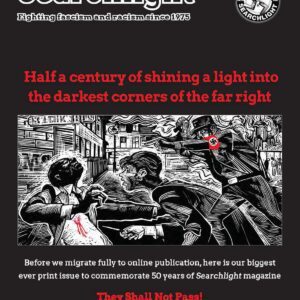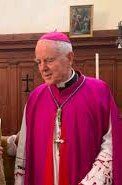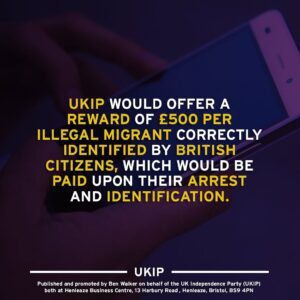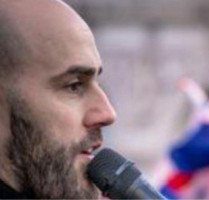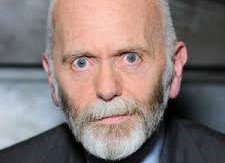Or, how a ‘Tommy Robinson’ whip-round divvy-up has fired up a right wing Lynch mob. Can you remember when, before his latest stint in the slammer, ‘Tommy Robinson’ could be seen posing in an ‘I am Peter Lynch’ T-shirt? We all took it at the time as being an example of statements of identification with […]
Patriotic Alternative register political party – under another name
Patriotic Alternative, one of Britain’s most overt nazi organisations, has secretly registered as a political party with the Electoral Commission under another name. EC records show that in November, the Identity Party, with an address in Poole, Dorset, was registered with the Commission. However, the Leader of the party, and its Nominating Officer, is recorded […]
UKIP leader Tenconi to Rupert Lowe MP: Come into my hate-filled parlour
Sitting in a pub with a beer in front of him, UKIP Leader Nick ‘The Kick’ Tenconi makes an offer to Reform UK’s dissident and suspended MP, Rupert Lowe. ‘When you’re ready to get serious and jump on the team for the big win, my line and my door is open, for talks. Call me.’ […]
Searchlight Magazine’s final issue – more of an ‘au revoir’ than a ‘goodbye’
Searchlight the printed magazine is bowing out after half a century in continuous publication. It was launched with a February 1975 cover date, and the 50th anniversary issue is out now. The new magazine was in part the reincarnation of a (very) occasional newspaper of the same name, launched by some of the people who […]
The end of an era for the anti-fascist movement – Searchlight founder Gerry Gable retires
With the publication of the final print edition of Searchlight, the magazine’s founder and often-times editor, Gerry Gable, has announced that he is stepping back from running the magazine. The final issue, a huge 72-page look back over the magazine’s history and achievements, comes shortly after Gerry’s 88th birthday, and in it he writes that: […]
Fascists and antisemites mourn death of rogue bishop
Last week’s funeral of the far-right, schismatic Bishop Richard Williamson brought into sharp focus the longstanding connections between some ultra-conservative Catholics and a world of antisemitic bigotry, Holocaust denial and fascist politics. Williamson died last month aged 84, a few days after suffering a brain haemorrhage. He had been excommunicated from the Roman Catholic Church […]
‘Batshit preacher’ accused of ‘intentionally antisemitic rhetoric’ by his former church
The Anglican Catholic Church in Michigan, which withdrew Calvin Robinson’s licence to minster in January, has accused the far-right clergyman of using “rhetoric that was clearly and intentionally anti-Semitic”. The ACC had been Robinson’s church since last September when he decamped from the UK to take charge of an ACC parish in Grand Rapids, West […]
British Democrats host ‘well-oiled’ Webster
It would be remiss of us not to report the latest outing for one of the oldest Jew-haters in town, Martin Webster, who turned up as guest speaker at a British Democrats meeting in Kent last weekend. Webster, who will be 82 in a few weeks’ time, began his hatemongering odyssey in A.K. Chesterton’s League […]
Uniformed nazis parade in Wetherspoon’s pub
Members of the North-West branch of British Movement must have thought they were being rather clever. Just before Xmas they met up in a pub for their regular branch meeting, paraded in their new BM phoenix emblazoned-shirts, then went out stickering streets in the centre of Manchester. They posted all this online, but hid their […]
Tenconi’s fascists flop in Manchester
Reports of planned march and rally organised by the fascists of UKIP were doing the rounds for several weeks. Those of us in the know understood that the new UKIP, under Nick Tenconi, is desperate for publicity and wants to encourage its membership to take to the streets. Saturday 22 February, 1pm, Manchester City Centre. Be […]
Tice sliced and diced as Farage and Yusuf tighten grip on Reform UK
Stung by repeated accusations – not least from former deputy leader Ben Habib, and indeed Searchlight – that Reform UK was not in any normal sense a political party, despotic leader Nigel Farage eventually issued a promise to democratise the organisation and put power in the hands of its claimed 200,000 ‘members’ (not that it […]
No meringue for Lennon – or, how the state is NOT trying to kill ‘Tommy Robinson’
It’s official! The state is deliberately starving Stephen Lennon (alias Tommy Robinson) in his prison cell. Well, almost official. In fact, it’s the current messaging on the rabble-rouser’s Twitter / X account, so you may well be assuming that its status is testicular in nature. And you’d be right, “URGENT UPDATE ON TOMMY’S SITUATION” begins […]
Blobs, swastika tattoos and Zionist spies – new Gaza row splits far right
A simmering feud among Britain’s most extreme racists has again exploded into a war of fierce insults. So far this is only online, since none of the groups involved seem capable of contesting elections. (One of the largest, Patriotic Alternative, is unwilling even to register itself as a political party because its leaders fear scrutiny […]
UKIP and the deranged Mr Bean
UPDATE: Only 24 hours after we posted this story, our UKIP sources called in to say that the party’s ’Heritage & Noble Principles of the British People’ spokesperson, Dean Neil, was reported to have spontaneously resigned in protest over the Bean appointment. One source even specified that Neil was reacting directly to seeing the Searchlight […]
Britain First desperately rattle begging bowls as Nuneaton disaster looms
Britain First are banging the begging bowl rather loudly ahead of their 1 March jamboree in Nuneaton. One might almost get the impression that they are beginning to fret that there aren’t enough funds in the party’s accounts to mount this kind of exercise. Troop leader Paul Golding has been handing out some stick to […]
UKIP pledges to set bounty hunters after ‘illegal immigrants’
UKIP, already sinking to new racist depths under recently appointed leader Nick Tenconi, hit a new low yesterday when they pledged to put a bounty on the heads of ‘illegal immigrants’. They have announced that they would “offer a reward of £500 per illegal immigrant correctly identified by British citizens”. Led by two convicted criminals […]
‘Batshit’ preacher sacked by his own church for nazi salute
Well, Calvin Robinson, the batshit and increasingly self-important preacher, thought he was being so funny, and so clever, when he topped off a speech to the far-right Pro-Life Summit in Washington DC by mimicking Elon Musk’s nazi salute. He left the stage to wild applause, grinning smugly. Unfortunately for him, there were others who didn’t […]
The case of UKIP’s vanishing candidates
The last NEC meeting of the increasingly Tommy Robinson-adjacent UKIP was entertaining for a number of reasons, not least of all the list of candidates approved for the next parliamentary election, a list which did not even survive the publication of the minutes. Ten candidates were rubber-stamped by the newly constituted NEC. Sadly, two of […]
Homeland announce ‘literary giant’ as star turn at £40-a-head remigration snoozefest
“We will make ‘remigration’ the word of 2025,” boasts Homeland’s Kenny Smith. Well, we’re probably going over the top in calling it a boast. In far-right terms, it probably already is the word of the year. The world and his frau seem to be using it ad nauseam. Ah! But the rest are not using […]
UKIP slavering at prospect of Musk money
Two people who will be watching the news a little nervously this weekend are UKIP’s Chairman Ben ‘Rogue Builder’ Walker and Nick ‘The Kick’ Tenconi, the brace of convicted criminals who run the party. They have been going about with a bit of a spring in their step recently, since news came from across the […]



